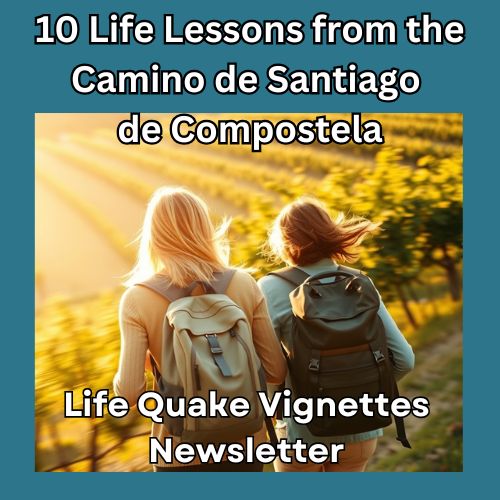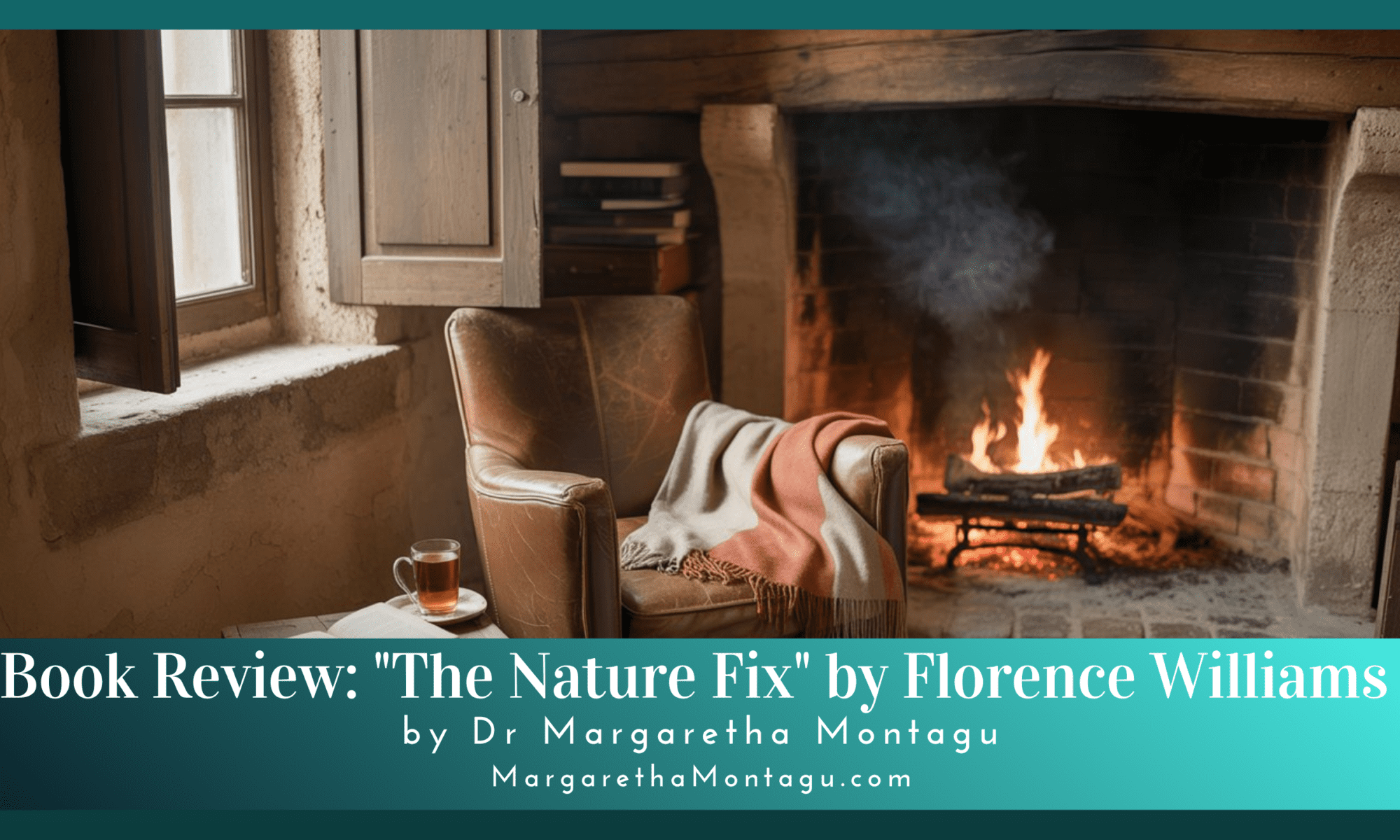Why Nature Makes Us Happier, Healthier, and More Creative
I’ve always believed in supporting other authors-especially non-fiction authors-and one of the ways I do that is by sharing book reviews. I focus on the books that have truly shaped how I live, work, and support people through life transitions. These aren’t just summaries; they’re stories of how certain ideas can shift the way we see ourselves and the world.
1. The Spark
Imagine you’ve just finished a draining day of back-to-back Zoom calls. Your head aches, your shoulders feel like concrete, and your to-do list is breeding new items when you’re not looking at it. You step outside for a second, desperate to escape, and suddenly the air feels fresher, birds are singing joyfully somewhere nearby, and the smell of damp leaves floats on the breeze, the sun warms your skin. In less than a minute, your body sighs in relief. That’s the moment Florence Williams calls “the fix.”
2. Why This Book Matters
Most of us live in a state of chronic nature deficiency. We spend 90% of our time indoors, under artificial light, surrounded by the hum of electronics. We treat nature as optional—something reserved for vacations, Sunday hikes, or Instagram-worthy moments. But research shows this deprivation quietly erodes our well-being: higher stress levels, lower attention spans, weaker immune systems, ever more anxiety. We’re overfed with data and starved of birdsong. This book argues that the consequences of ignoring our need for nature are not small—they’re central to the burnout and disconnection so many of us feel.
3. The Big Idea
What if the cure for modern malaise is as close as the nearest tree? Williams shows that nature isn’t just “nice” or “soothing”—it’s biological fuel. It lowers cortisol, restores focus, improves creativity, strengthens immunity, and enhances our mood. Best of all? The dosage doesn’t have to be huge. You don’t need to hike the Rockies, sometimes, fifteen minutes in a park or even gazing at greenery through a window is enough. The idea is radical in its simplicity: you can feel better, think clearer, and live longer, simply by stepping outside.
4. The Structure of the Book
This book is part travelogue, part science investigation, part love letter to the outdoors. Williams begins in Japan, where shinrin-yoku (forest bathing) is prescribed by doctors as preventative healthcare. She travels to South Korea’s healing forests, where rangers lead mindfulness sessions under canopies of pines. Then to Scandinavia, where friluftsliv (open-air living) is not a fad but a cultural foundation, built into daily life and education. Back in the U.S., she visits wilderness therapy camps for veterans, city parks studied by neuroscientists, and even experiments with soundscapes that simulate the outdoors. The book is structured as a journey across the world—but also into the deep recesses of our brains, revealing how connected we are to the natural world.
A diverse body of scientific literature consistently supports the beneficial impact of nature on wellbeing, making nature exposure a recommended strategy for maintaining and improving mental health. (Jimenez MP, DeVille NV, Elliott EG, Schiff JE, Wilt GE, Hart JE, James P. Associations between Nature Exposure and Health: A Review of the Evidence. Int J Environ Res Public Health. 2021 Apr 30;18(9):4790.)
Recent Research Articles
- A lower connection to nature is related to lower mental wellbeing (2024): Highlights that individuals with a strong connection to nature report less stress, anxiety, and higher life satisfaction when spending time in natural spaces. (Chang, C., Lin, B. B., Feng, X., Andersson, E., & Gardner, J. (2024). A lower connection to nature is related to lower mental health benefits from nature contact. Scientific Reports, 14(1), 1-9.)
- How Does Nature Exposure Affect Adults With Symptoms of Mental Illness? A Meta-Analysis (2024): Demonstrates that spending time in nature reduces depressive symptoms and stress, increases quality of life and mood, and improves mental health for adults, especially those with symptoms of mental illness. (Bettmann JE, Speelman E, Blumenthal E, Couch S, McArthur T. How Does Nature Exposure Affect Adults With Symptoms of Mental Illness? A Meta-Analysis. Int J Ment Health Nurs. 2024 Dec;33(6):1889-1907.)
- Nature’s impact on human health and wellbeing: the scale and drivers of benefits (2025): Provides evidence for the beneficial effects of contact with nature on both physical and mental health, emphasising the importance of access to green spaces. (Zerbe, S., Schmid, H., Hornberg, C., Freymüller, J., & Mc Call, T. (2025). Nature’s impact on human health and wellbeing: The scale matters. Frontiers in Public Health, 13, 1563340.)
5. Key Insights
- In Japan, blood samples showed reduced stress hormones and boosted immune cells after just a few hours of forest immersion.
- In Finland, schoolchildren’s test scores improved when recess was held outside in nearby woods.
- In Colorado, veterans with PTSD reported breakthroughs in healing after extended time in wilderness programs.
- Neuroscientists found that bird calls and rustling leaves activate the parasympathetic nervous system, countering stress faster than any app ever could.
Each story carries a touch of wonder, like proof that we carry ancient instincts that only awaken when the wind brushes through leaves.
6. The Author as a Guide
Florence Williams is a journalist with a sharp eye and a quick wit. She doesn’t simply report the science—she dives into it, often as her own guinea pig. She straps on a portable EEG monitor to see how her brain responds to birdsong, she hikes until blisters form, and she signs up for wellness experiments. Her style blends curiosity with humour, and her honesty about her own struggles (from stress to heartbreak) makes her relatable. She’s not a professor lecturing from a podium; she’s your adventurous friend saying, “Come on, let’s try this together.”
7. What Stuck With Me (Personal Connection)
The section that stayed with me most was her exploration of “nearby nature.” Like many people, I’d always imagined the real benefits came only from epic landscapes—mountains, oceans, untouched forests. But Williams shows that your nervous system responds to any greenery, even the trees on your block or the view from your office window. That gave me permission to stop waiting for the next vacation to “get my nature fix” and instead build small daily rituals—coffee on the balcony, a short walk in the park, a pause to notice the sky.
And yet, I also found myself remembering how powerful it feels when you can step away from daily life completely—when nature isn’t a quick break, but the entire backdrop. That’s one of the reasons I host Camino de Santiago walking retreats in the French countryside: because sometimes, we need not just a moment with nature, but days to let its rhythm sink into us.
8. The Takeaway
This isn’t just a book about science. It’s a book about reclaiming sanity. The transformation it offers is subtle but profound:
- Before: rushed, tense, wired on coffee, disconnected from your senses.
- After: grounded, sharper, more creative, more present.
It reframes nature from something decorative to something medicinal, reminding us that the path to clarity, joy, and resilience may be as close as your doorstep.
9. Who This Book is For (and Not For)
For: busy professionals, parents, city dwellers, anyone craving calm, focus, and balance. For those who love science but also crave story. For sceptics who want proof that nature is more than “woo-woo.”
Not for: readers looking for a purely technical ecology manual or hard-core hikers seeking survivalist tales. This isn’t about conquering nature; it’s about letting it heal you.
10. The Resonant Quote
“The more high-tech we become, the more nature we need.”
In one line, Williams captures the paradox of our age: as we race forward into ever more digital lives, our souls need the grounding of dirt, sky, and trees more than ever.
11. The Cliffhanger
The book doesn’t end with individual healing. Williams broadens the view to communities and culture. What would happen if cities were designed for birdsong and walking paths as much as for cars and office towers? What if schools, workplaces, and hospitals integrated daily doses of greenery? The final pages hint that our collective future—our health, creativity, even compassion—may depend on how urgently we rewild our daily lives.
12. Final Word (Why It’s Worth Reading Now)
In an age of burnout, fractured attention, and creeping disconnection, The Nature Fix is a clarion call: your best medicine has been waiting outside all along. This isn’t a book that scolds—it invites, with humour and hope. Read it if you’re ready to rediscover the wild remedy that has been quietly holding you all your life.
About the Author
Florence Williams is an award-winning journalist, podcaster, and contributing editor at Outside magazine. Her work has appeared in National Geographic, The New York Times, and Slate. She has a gift for translating complex research into engaging, funny, and deeply human stories. Williams herself is a lifelong nature lover and sceptic-turned-believer in its healing power—qualities that make her the perfect companion for this journey.
Other Books by Florence Williams
- Heartbreak: A Personal and Scientific Journey (2022)
After her marriage unexpectedly ended, Williams set out on a quest to understand what heartbreak does to our bodies and minds. Blending memoir, neuroscience, and storytelling, she explores how loss affects the brain, immune system, and even longevity—and how we can recover and grow. It’s intimate, raw, and surprisingly hopeful. Five Books “Best Literary Science Writing” Book of 2023 • Smithsonian Best Science Book of 2022 • Prospect Magazine Top Memoir of 2022 • KCRW Life Examined Best Book of 2022 - Breasts: A Natural and Unnatural History (2012)
This award-winning book dives into the cultural, medical, and environmental story of breasts. Williams investigates everything from puberty and sexuality to the chemicals in breast milk, weaving science with humour and humanity. It’s both an eye-opening exposé and a fascinating history of one of the most symbolically loaded parts of the human body. 2012 New York Times Notable Book, 2013 Los Angeles Times Book Award Winner in the Science & Technology category
Dennis’s Story
Dennis was a middle manager whose life was measured in deadlines and coffee refills. His daily commute was a blur of traffic and talk radio, and by evening, he was too drained to do more than collapse on the couch with his phone. Weekends weren’t much better—catch-up laundry, a bit of Netflix, and the gnawing sense that something was missing.
A colleague passed him The Nature Fix with a wry smile: “Maybe this is what you need more than another energy drink.” Dennis was sceptical—how could a book about trees help? But a chapter on the “15-minute effect” caught his attention. Fifteen minutes outdoors, Williams claimed, could lower stress hormones and sharpen focus. Dennis thought, Even I can try fifteen minutes.
The next day, he walked to a scruffy little park near the office. At first, he fiddled with his phone. Then he noticed a sparrow tugging at a piece of twine, the way the sunlight angled through the branches, the surprising stillness in his chest. By the end of the week, he realised he wasn’t hitting the afternoon slump as hard. He was more patient with his kids at dinner. His wife teased that he was “becoming one with the squirrels.”
Two months later, Dennis’s “bench breaks” had become sacred. He began weekend hikes with his family, swapped one evening of TV for evening walks, and even found himself brainstorming better at work. The change wasn’t dramatic, but it was steady: he felt lighter, sharper, more alive. All from a book that reminded him of something he already knew but had forgotten—that he belonged outside.
Other Books Like The Nature Fix
- Last Child in the Woods: Saving Our Children from Nature-Deficit Disorder by Richard Louv
The groundbreaking book that coined the phrase “nature-deficit disorder.” Louv argues that children today are suffering from a disconnect with nature, and he shows how outdoor time is crucial for development, creativity, and well-being. - The Hidden Life of Trees: What They Feel, How They Communicate—Discoveries from a Secret World by Peter Wohlleben
A German forester reveals the astonishing ways trees communicate, nurture one another, and even have social lives. It’s part science, part poetry, and makes you see every forest with new eyes. - Braiding Sweetgrass: Indigenous Wisdom, Scientific Knowledge, and the Teachings of Plants by Robin Wall Kimmerer
A botanist and member of the Citizen Potawatomi Nation blends Indigenous wisdom with modern science, offering moving essays on reciprocity, gratitude, and our relationship with the natural world. - Blue Mind: The Surprising Science That Shows How Being Near, In, On, or Under Water Can Make You Happier and Healthier by Wallace J. Nichols
Explores the profound calming and healing effects of water on the human brain, from lakes and rivers to the ocean. A natural companion to The Nature Fix. - Your Brain on Nature: The Science of Nature’s Influence on Your Health, Happiness and Vitality by Eva M. Selhub and Alan C. Logan
A more clinical but fascinating look at how green space and natural exposure directly impact mental health, stress levels, and overall vitality. - The Wild Remedy: How Nature Mends Us—A Diary by Emma Mitchell
A beautifully illustrated nature diary by an artist who finds solace and healing for depression in the British countryside. Gentle, visual, and deeply personal.
If this book sparks something in you—the call to spend more time outdoors, to slow down, and to reconnect with the natural rhythm your body and soul crave—you might love joining my Rediscover Your Natural Rhythm Nature Immersion Camino de Santiago Hiking Retreats. Over five days in the French countryside, we walk ancient pilgrimage paths, breathe with the seasons, and let nature restore clarity, balance, and joy. Think of it as giving yourself the gift of the “ultimate nature fix,” with a little Camino magic woven in.

10 Powerful Life Lessons Learned While Walking the Camino de Santiago – a free guide filled with 10 not just “quaint anecdotes” or Instagram-worthy moments (though there are plenty of those) but real transformations from real people who walked the same insight-giving trail you might want to walk one day – Subscribe to my monthly newsletter to Download the Guide

Author Bio: Dr Margaretha Montagu – described as a “game changer”, “gifted healer”, “guiding light” and “life-enriching author” – is an experienced medical doctor, a certified NLP practitioner, a medical hypnotherapist, an equine-assisted psychotherapist (EAGALAcertified) and a transformational retreat leader who guides her clients through life transitions – virtually, or with the assistance of her Friesian and Falabella horses, at their home in the southwest of France.

